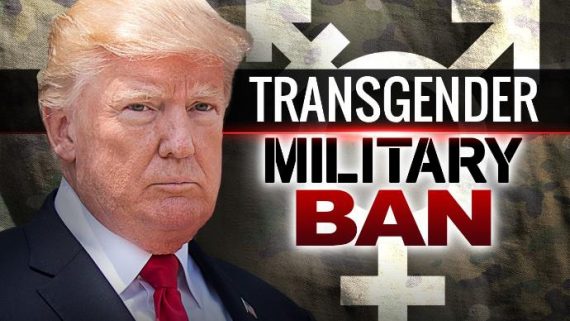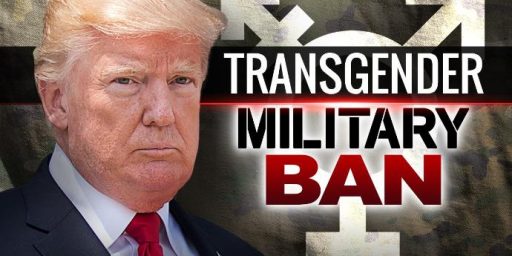Defense Secretary Mattis Leaning Toward Allowing Transgender Troops To Remain In The Military
The Defense Department will reportedly recommend to President Trump that transgender members of the service currently serving in the military be allowed to continue serving.
Last summer, President Trump announced out of the blue on Twitter that he would be implementing a ban on transgender soldiers from serving in the military. The announcement, which reversed a policy change that the Obama Administration had announced in 2016, came as a surprise to pretty much everyone since there had been no indication that the issue was under consideration by the White House and the Defense Department was continuing to work on implementing the Obama Administration’s plan. In the immediate aftermath of the President’s announcement, the military leaders at the Defense Department stated that current policy would remain in effect notwithstanding the President’s tweets unless and until a formal order was received from the White House. Shortly thereafter, the Commandant of the U.S. Coast Guard stated that his branch of the service would continue to follow the Obama Era policy until they receive a formal order to the contrary.
That order came in August of last year, but it has yet to be fully implemented. Part of the reason for that is the fact that the order Trump issued called on the Pentagon to study the issue further in order to develop a set of rules to put the policy into effect, including the issue of how to handle the issue of how to deal with people who had revealed themselves to be transgendered to commanding officers and fellow soldier and soldiers. Initially, Secretary of Defense James Mattis responded to the Trump Administration order by saying that the Pentagon would allow transgender troops to continue serving while the issue was being studied. That statement was mistakenly interpreted by some media outlets and political pundits as Mattis essentially disobeying a Presidential Order. Additional constraints on any action by the Pentagon have come from a pair of rulings from Federal District Courts in Washington, D.C. and Maryland putting enforcement of the Administration’s order on hold pending final hearings in both cases. Both of these cases were brought by separate groups of individual servicemembers who had revealed themselves to be transgender in reliance upon the Obama Administration policy and that the change in policy ordered by President Trump would harm them in their careers and violate their rights. While those orders remain in force, the Pentagon is barred from taking any action against any currently serving servicemember who has come out a transgender and to continue accepting recruits who are transgender. In the meantime, the Pentagon continues the study that began in August in an effort to effectively implement President Trump’s order.
Now The Washington Post reports that Defense Secretary Mattis is expected to back a policy that would allow those servicemembers who came out as transgender in reliance on the Obama Administration policy to remain in the service:
Defense Secretary Jim Mattis is expected to propose to President Trump that transgender members of the U.S. military be allowed to continue serving despite the president’s call last summer for a ban on all transgender service members, according to two U.S. officials with knowledge of the issue.
The defense secretary was scheduled to brief the president Wednesday, but the meeting was postponed and will occur soon, officials said, speaking on the condition of anonymity to discuss policy deliberations. Dana White, a spokeswoman for Mattis, said the secretary will provide his recommendation to Trump this week and the president will make an announcement at some point afterward.
Officials at the White House and Pentagon declined to comment on the recommendations until Mattis delivers his plan.
“This is a complex issue, and the secretary is taking his time to consider the information he’s been given,” White told reporters Thursday. “It’s an important issue, and again, he sees all of his decisions through the lens of lethality.”
Trump surprised many Pentagon officials on July 26 by issuing a string of tweets in which he said he was banning all transgender people from the military, despite not having a plan in place. Trump tweeted that he had reached his decision “after consultation with my Generals and military experts,” citing the “tremendous medical costs and disruption” he believed it would cause.
Marine Gen. Joseph F. Dunford Jr., the chairman of the Joint Chiefs of Staff, moved afterward to stop any changes from taking place until a new policy was adopted, and Mattis backed the move. The Obama administration began allowing transgender people to openly serve in the military in June 2016, prompting some people to come out for the first time.
It’s unclear whether Trump will adopt Mattis’s recommendations, which the president requested in an Aug. 25 executive order. Trump directed the military at the time to “return to the longstanding policy and practice on military service by transgender individuals that was in place prior to June 2016,” but left an opening under which Mattis could advise him in writing on changing Trump’s new policy. The order gave Mattis until Wednesday to establish a plan.
As I noted above, the order that Trump issued in August did not direct the Pentagon to dismiss transgender members of the military who had already revealed their identity in reliance on the policy change that had been announced by the Obama Administration in 2016. It also didn’t say that servicemembers who are currently serving should be barred from continuing to serve if it is discovered that they are transgender. At the same time, though, as the lawsuits in Washington and Maryland indicate, the order did place such people in a sort of legal limbo and cause them to fear that their career could come to a swift end due to their reliance on the change in policy announced in 2016 or if their gender identity is discovered notwithstanding efforts to hide it. It also called into question the ability of such servicemembers to advance up the ranks even if they weren’t dismissed from the military. This, of course, is why the lawsuits noted above were filed, and at least so far it looks as though the Plaintiffs in those cases are going to be successful. Additionally, the fact that these court orders could be overturned on appeal means that these servicemembers still have reason to worry about their careers until a final policy is announced. Because of that, the policy that Mattis appears ready to recommend to the President would no doubt bring reassurance to these servicemembers, as well as being arguably the only fair and just manner to deal with the legal and moral issues their cases raise.
More importantly, there is simply no evidence that allowed transgender servicemembers to serve openly would have a deleterious impact on military readiness, unit cohesion, or national defense. This is confirmed by a number of studies, including one conducted in 2015 by the RAND Corporation, as well as by the experiences of dozens of nations around the world that allow open service by transgender troops. This list includes close American allies such as Australia, Austria, Belgium, Bolivia, Canada, Czech Republic, Denmark, Estonia, Finland, France, Germany, Israel, the Netherlands, New Zealand, Norway, Spain, Sweden and the United Kingdom. (Source) Additionally, the fact that there has been no measurable impact from allowing gays and lesbians to serve openly in the seven years since the Don’t Ask, Don’t Tell policy was ended argues strongly that the results would be the same for transgender troops. Because of this, the policy that Secretary Mattis is expected to recommend to President Trump is both the only just and fair way to deal with the issue of transgender servicemembers who have already come forward and the best resolution of this complicated issue for the military as a whole.




Honest to God, just tell Trump they’ve all been kicked out and then don’t do anything. Like he’s going to find out on his own somehow? Like he’s going to check? Seriously, just let him think it’s all taken care of just like he wanted and the problem’s solved.
I would love it if all his Secret Service bodyguards were transgendered. And he knew it.
@Not the IT Dept.: I used to just tell my boss, “yeah, I took care of it.” Normally, even if he followed up, he couldn’t tell what, if anything, had happened.
And my boss was a bunch smarter than Trump.
On the other hand, Mattis just took care of the major impact of transgenders joining the military. They’d join, then go for reassignment surgery and be not fit for full duty for a long time. Now, barring combat injured, you either stay fit for deployment or you are out. It seems logical that would impact discretionary surgery that renders the member not fit for full duty for long periods.